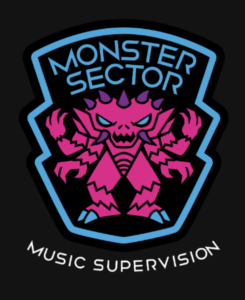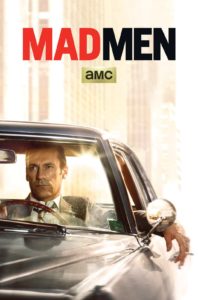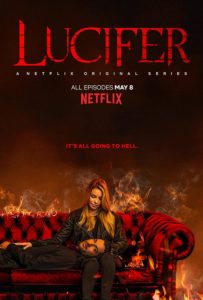
Over the past 10 years at Chop Shop, Justin Kamps earned credit as Music Supervisor on the shows Lucifer (Netflix), Another Life (Netflix), and Insatiable (Netflix), Co-Music Supervisor on the film A Futile and Stupid Gesture (Netflix), Music Coordinator on Z: The Beginning of Everything (Amazon), and uncredited work on a wide variety of projects like Scandal (ABC), How to Get Away With Murder (ABC), Supernatural (CW) and Council of Dads (NBC) amongst many others.
Tell me about your new company Monster Sector.
 At Chop Shop I learned everything about music supervising. Then Chop Shop closed its doors as founder Alex Patsavas moved over to Netflix to build up their music department. I really wanted to continue with Music Supervision, so I launched Monster Sector in 2020.
At Chop Shop I learned everything about music supervising. Then Chop Shop closed its doors as founder Alex Patsavas moved over to Netflix to build up their music department. I really wanted to continue with Music Supervision, so I launched Monster Sector in 2020.
How has music supervision changed over the last ten years? Is it easier or harder to clear famous music?
Over the years I’ve seen artists who are tough to clear but are now suddenly more open. With more streaming platforms like Netflix and Amazon, there’s a huge mountain of content and more opportunity for syncs. Artists, publishers and master owners know it’s a strong revenue source.
With all this content, sync budgets overall seem to be lower.
Yes, but there are more opportunities for up-and-coming artists interested in breaking out. Artists are open to lower fees if necessary. Even bigger acts are flexible. It’s not like you’re going to get The Killers for super cheap, but there’s a lot more wiggle room.
So there’s a chance for new music artists with great material to get placed in film and TV?
Even though there are tons of shows, it’s not like each has a huge budget. If the producers want to use eight songs an episode it’s a great opportunity for up-and-comers — if the music is great.
Do you find it is better if music creators are focused on one kind of music or more across the board?
It depends. If one genre of music is getting placed for you, then stick with that. If you are good across several genres, I’m not going to tell you to not do that. If your goal is to be a composer or to provide to music libraries, you want to be doing a bunch of stuff. However, if I hear different genres under the same artist name, it may be a little bit confusing.
Are there any trends you notice? We’ve been seeing a big increase in requests for “vintage” period music that is pre-cleared or easy clear.
 Yes, we were using a lot of that at Chop Shop for Mad Men. That’s where I got introduced to “orphan” music from the 50’s 60’s 70’s 80’s – music from the period that was perhaps self-released, or no longer in a record deal. Many of these artists have passed away and now their families own the music. It’s amazing what you can find in those old bins, how good some of that is compared to a track you were prepared to spend 50K on!
Yes, we were using a lot of that at Chop Shop for Mad Men. That’s where I got introduced to “orphan” music from the 50’s 60’s 70’s 80’s – music from the period that was perhaps self-released, or no longer in a record deal. Many of these artists have passed away and now their families own the music. It’s amazing what you can find in those old bins, how good some of that is compared to a track you were prepared to spend 50K on!
What is the process for each show you work on?
The process for any show is – first we get the scripts for the season. We see if there’s any scripted music or any scripted on-camera vocal performances that need a pitch of clearance (Lucifer performs a song at LUX).
We have to clear that song before the show even shoots. Once post starts, I’ll be sending music to the production. I give them a bunch of music that is in line with what the show uses every season. We’ll have that to start off with.
As you’re getting to the end of post, is that when you start clearance and licensing, getting quotes finished?
As we move closer to the mix date, that is when we have spotting sessions. We’re finalizing the music lists and dealing with any clearance situations we have, so we have everything done in time.
Supervisors say that is a tricky time. Last minute second something falls out, you must find a replacement and you only have a few hours to a day.
I always try to make sure we have buffer time, but sometimes you have to come up with a fix!
The pandemic hit the industry hard. Production is social activity.
Yes, and I also really feel bad for the artists, they have not been able to tour, and now they also have a huge drop in sync opportunities.
What are you working on now?
 The new season of Lucifer on Netflix. We just released Season Five. After a delay, they were finally able to shoot the Season Finale, and now there’s an entire new Season 6 coming. I’m also working on another season of the sci-fi series Another Life. And we are working on a second season of Nancy Drew for CBS productions (CW show). One of the reasons I chose my company name Monster Sector is that I’m really into Sci-fi, horror!
The new season of Lucifer on Netflix. We just released Season Five. After a delay, they were finally able to shoot the Season Finale, and now there’s an entire new Season 6 coming. I’m also working on another season of the sci-fi series Another Life. And we are working on a second season of Nancy Drew for CBS productions (CW show). One of the reasons I chose my company name Monster Sector is that I’m really into Sci-fi, horror!
Tell us about your experience at the virtual Springboard Festival “Moment of Truth” even where you heard new songs by emerging artists and gave your opinion about their sync-ability.
I had a lot of fun doing the Springboard moment of truth. It’s great to see during this pandemic you giving artists an opportunity to get direct feedback from people in the industry. We heard some really good stuff there, and some people reached out and emailed me their music afterwards. That kind of thing improves connections between people and could lead to a potential sync, you never know!
How did you get involved in music?
I’ve been involved in music some way my entire life. Some of my earliest memories were even before going to Kindergarten, my folks enrolled me in a music class where I got to mess around with instruments. I listened to classical music and even recorded some goofy compositions. My mom was an organist and in the choir at our church in Germantown, Wisconsin. I got into the kids’ choir in church. Eventually I joined my middle school band playing trumpet, and also played it in High School. I was a Music Major in college and graduated with music degree.
What got you started in music supervision with Chop Shop?
I was very interested in film and TV music. I worked at a movie theater. I was always obsessed with the music and wondered “who does that?” In college a friend and I made a documentary about our choir. We had to decide what songs would be great. It piqued my interest. Who does that kind of thing? At the time I was watching shows like Rescue Me. So, I started to learn about Alex Patsavas and what she did. It sounded like the perfect job, so how do I get into this? I figured the best way was more education, so I ended up going to Columbia College Chicago.
They had a music supervision class and one of the teachers used to work at Chop Shop. She knew I had been accepted to the Semester in LA program and suggested I apply for an internship with Chop Shop while I’m out there. They were working on the Twilight movie series, and I think they thought a guy might be to a good choice for an intern at the time — someone who wasn’t obsessed with it and wouldn’t reveal the secrets!
Interview by Julius Robinson
